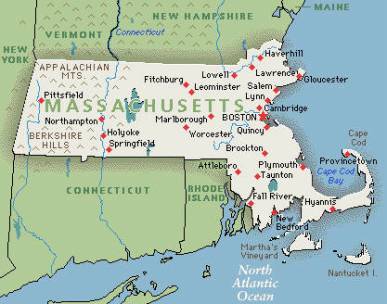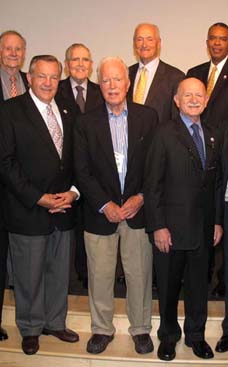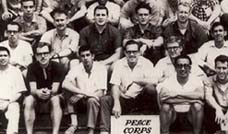
Mr. Darling met his wife, Carol, when they both attended the University of Massachusetts, but he spent most of his working years in the Midwest. He began his economic development career, however, as a Peace Corps volunteer in the Republic of Botswana. After he received a master's degree from UMass, he got a job at Purdue University. For five years, he worked on a rural development project in Indiana. Following that, he looked at economic factors in Ohio, receiving his doctorate from Ohio State University. He then taught at Kansas State University for many years, becoming a full professor in the department of agricultural economics. During his work there, he produced and distributed retail trade data for the state of Kansas as the extension specialist in economic development at Kansas State. He has analyzed trade and worked with economic development in places ranging from Kansas to Canada. He even went to Poland, where he had a six-month contract with the US Department of Agriculture. Mr. Darling retired from teaching in 2005 and in 2008, he and his wife, a West Barnstable native, returned to the Cape. But on Cape Cod, Mr. Darling found a scarcity of the data that had been the core of his professional work. As he interested himself in the local economy, having served on Sandwich's Economic Development Committee and the Sandwich Economic Initiative Corporation, he began gathering data himself, using sources such as the US Census Bureau and the state's wage and employment data. Mr. Darling said that, instead of the retail trade data he recently collected, he could just as easily have focused on, say, an area's tourist-related pull factor. Or, once the data shows that a retail area is not capturing its fair market share, information could be gathered that would show what goods and services are needed to keep people shopping locally. While he now operates as a consultant under the company name Sustaining Progress, and can be hired to perform a specific market analysis, he is also quick to share his Cape Cod data and his expertise with anyone who is interested in it.
Botswana RPCV David L. Darling Takes A Close Look At Cape's Retail Market
Economics Expert Takes A Close Look At Cape's Retail Market
By: Diana T. Barth
Published: 07/29/11
What town on Cape Cod has the largest retail market share? Where do those working in retail make the most money? And perhaps most important, which town's retail area is the most attractive to consumers?
Economic development expert David L. Darling, a Sandwich resident, was used to having sets of data that would answer those and similar questions. When he saw that basic economic information was not readily available on the Cape, he set out to gather it himself.
For last summer, at least, the answers culled from his data showed that Barnstable, including Hyannis, had the largest market share. However, the retail employees in Bourne made the highest wages, and Provincetown was the most most attractive retail center-the area that garnered the most people over and above the local population.
Mr. Darling, a former economics professor, began by looking at Barnstable County's retail trade over the third quarter of 2010, or July, August, and September of last year. He made that decision, given the availability of state data and the newly released population figures from last year's federal census.
In making a start, he looked at retail alone, not including amusements, restaurants, theaters, or the like.
The data he compiled, now neatly set out in a table, contains some figures that are not unexpected. Of the county's 15 municipalities, the Town of Barnstable's retail market share of 31.94 percent was the highest. That percentage means the town captured almost a third of all of the retail trade available in the county last summer.
Truro had the smallest market share, or 0.37 percent. Sandwich had 4.16 percent; Bourne, 5.65 percent; Mashpee, 6.84 percent; and Falmouth, 12.47 percent.
Mr. Darling's table also contains data that may catch some by surprise. Last summer, retailers in the Town of Bourne paid their employees, on average, $693 per week, the highest in Barnstable County. The lowest average retail salaries, or $386 per week, were paid in Brewster.
The data, Mr. Darling said, are descriptive. The information he has compiled to date provides the "what," not the "why."
That is not to say, he continued, that an analysis of the "whys" involved could not be performed. Collecting the data, however, is always a starting point to determining the why behind a given fact.
Maybe, for example, Bourne's average retail wages are higher because some of the products made and sold in Bourne, including custom sails and sailboats, involve more full-time employees and command a higher wage. Perhaps Brewster's average wages are lower because small shop owners work full time, without taking a "wage," and their employees are paid as part-timers.
It is finding actual answers to the why questions that Mr. Darling finds "fascinating." Whatever the answers, however, the questions start with data.
Although data collection is, in essence, always a look back, economic development analyses can be predictive, Mr. Darling said. There are even formulas that can be used to determine, for example, how many dollars in gross sales a retail store might be expected to earn if it relocated to a given place.
Mr. Darling, who is a past member of the Community Development Society and a former editor of its publication CD Practice, wrote an article for his peers that set out the formulas for doing just that. He published a case study in 1996 that set out and applied those formulas to a situation in which a person wanted to start an auto parts store in a specific small town. In that case, the numbers said such a business could be viable in that location.
In his Barnstable County data, Mr. Darling lists a "retail pull factor" for each town. It is, in essence, a measure of the attractiveness of each town's retail business for shoppers in the area.
The retail pull factor is, by nature, a comparative number, so Mr. Darling set that factor for the state as a whole at 1.0, allowing him to compare the 15 Barnstable County towns against that number. A 1.0, he said, would indicate a "perfect balance of trade," a situation where the retailers captured all of the potential trade in their area and did not lose customers to nearby retail areas. The Town of Barnstable, which has a pull factor of 2.21, has a dramatically positive balance of trade. The town has attracted more than twice the number of shoppers, or 221 percent of the local market share, than he would have anticipated in light of 2010 population data.
The county's highest pull factor, however, is in Provincetown, which had a pull factor of 6.04. It attracted about six times the number of customers than an analysis of its local population (called its "trade area capture") would have logically anticipated.
Bourne retailers employed 936 workers last summer to serve 17,700 customers, Mr. Darling's data shows. However, the relative strength of Bourne's retail market, the retail pull factor, was a mere 0.90.
That means, Mr. Darling said, instead of attracting its fair share of the market, there was more "leakage" than market capture. Comparatively more people went out of town to shop.
According to one of Mr. Darling's articles on analyzing retail markets, people tend to shop for services close to home-calling a local plumber, for example. They stay close to home for convenience, picking up many of their groceries at their nearest store. Shoppers will, however, go farther afield for larger goods, with price and selection becoming major determinatives. Today's shoppers will also buy smaller items such as books, and even shoes, online, but only if they can determine exactly what goods they are buying, Mr. Darling said.
One might speculate that Bourne's numbers reflect the fact that the town does not have a supermarket of its own, sending Sagamore residents to Sandwich, Cataumet residents to Falmouth, and Buzzards Bay residents to Wareham to shop for groceries, and, while they are there, for other things.
Sandwich's pull factor is even lower, at 0.63. It was not, however, the lowest on the Cape. Brewster's was 0.50.
Mashpee, whose Mashpee Commons attracts shoppers from Sandwich, Falmouth and elsewhere, had a pull factor of 1.53.
In comparison, Falmouth retailers, who employed 2,067 workers to serve 39,089 customers during the third quarter of 2010, had a retail pull factor of 1.24.
If he were looking at the "whys" behind the pull factor figures, Mr. Darling might start with rating the towns' retail areas on eight characteristics.
Those would include how compact the shopping location might be, asking if the stores, banks, services, and government offices are in close proximity and are visually "a neatly laid out place."
He might ask customers if they thought the businesses that grouped together were compatible, thus minimizing shopping time, as well as whether the parking and traffic patterns made shopping convenient. Business could also be evaluated on cleanliness, courteousness, and colorfulness, or whether the downtown is an interesting place to shop, with banners, storefront displays, and regular festivals and other events held there.
He might also ask if a retail area shows that individual and collective creativity is evident, as well as whether the local businesses coordinate hours, advertising, and sale dates, functioning like a shopping center rather than unilaterally.
The answers to all those questions might throw a light on why some areas are more popular than others, replacing speculation with explanation.
Mr. Darling met his wife, Carol, when they both attended the University of Massachusetts, but he spent most of his working years in the Midwest. He began his economic development career, however, as a Peace Corps volunteer in the Republic of Botswana.
After he received a master's degree from UMass, he got a job at Purdue University. For five years, he worked on a rural development project in Indiana. Following that, he looked at economic factors in Ohio, receiving his doctorate from Ohio State University. He then taught at Kansas State University for many years, becoming a full professor in the department of agricultural economics. During his work there, he produced and distributed retail trade data for the state of Kansas as the extension specialist in economic development at Kansas State.
He has analyzed trade and worked with economic development in places ranging from Kansas to Canada. He even went to Poland, where he had a six-month contract with the US Department of Agriculture.
Mr. Darling retired from teaching in 2005 and in 2008, he and his wife, a West Barnstable native, returned to the Cape.
But on Cape Cod, Mr. Darling found a scarcity of the data that had been the core of his professional work.
As he interested himself in the local economy, having served on Sandwich's Economic Development Committee and the Sandwich Economic Initiative Corporation, he began gathering data himself, using sources such as the US Census Bureau and the state's wage and employment data.
Mr. Darling said that, instead of the retail trade data he recently collected, he could just as easily have focused on, say, an area's tourist-related pull factor.
Or, once the data shows that a retail area is not capturing its fair market share, information could be gathered that would show what goods and services are needed to keep people shopping locally.
While he now operates as a consultant under the company name Sustaining Progress, and can be hired to perform a specific market analysis, he is also quick to share his Cape Cod data and his expertise with anyone who is interested in it.
Knowing the numbers helps people make wise decisions, he said. For those with questions, Mr. Darling can be reached at darling215@comcast.net or by calling 508-888-5280.
















